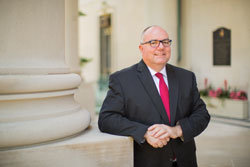Annually, 30 million people in the US suffer from eating disorders every year, including anorexia nervosa, bulimia nervosa and binge eating disorder, with the majority of victims in their teens and twenties.
Kristen O’Gara, a Licensed Clinical Social Worker (LCSW) and recovered anorexic, presented a documentary in Magill Commons on Thursday, March 6, titled, “Someday Melissa,” about a girl who died of bulimia complications at age 19. O’Gara closed the screening with an informative presentation about eating disorders.
Bulimia is defined as an eating disorder characterized by binging, or eating a large amount of food at one time and purging by way of vomiting. Other bulimia factors inlcude undergoing excessive exercise, as well as the use of laxatives, diuretics or fasting, according to eatingdisorderinfo.org.
Anorexia is different in comparison to other eating disorders in that the victims starve themselves, causing extreme weight loss. Binge eating disorder, the newest clinically recognized eating disorder, according to O’Gara, is eating a large amount of food in a short amount of time without purging.
In the film, Melissa showed many of the signs of bulimia as well as other indicators such as anxiety and depression, lack of self-control, poor self-esteem, and withdrawal from social activities from the time she was 13 until she died six years later. The cause of death was cardiac arrest due to irregular heartbeat, a common effect of eating disorders.
Jaclyn Griffith, a freshman social work major, is considering working with eating disorder patients in the future. “[It was surprising] how sad it was and how [Melissa’s] family did everything they were supposed to do and it still didn’t work in the end,” said Griffith, speaking about the film.
Dr. Franca Mancini, Director of Counseling and Psychological Services, said that it is important for students to be aware of the dangers of eating disorders because college is often the first time that they are caring for their own dietary needs. The desire to “fit in” in a new environment is also a contributing factor to unhealthy eating and exercise habits, according to Mancini.
According to the National Association of Anorexia Nervosa and Associated Disorders, 91 percent of college women in the US have tried to control their weight through dieting and 25 percent suffer from an eating disorder. Some studies suggest higher statistics.
Some other serious health complications of bulimia include vitamin and mineral deficiencies, gastrointestinal problems, irregular bowel movements and constipation, tears in the lining of the stomach, kidney problems and tooth decay. Anorexic patients experience health problems such as the cessation of a woman’s menstrual cycle and shrunken organs.
O’Gara said 66 percent of people with eating disorders also have depression and/or anxiety, 40 percent have obsessive compulsive disorder, 12 percent are bipolar and 30-60 percent suffer from post-traumatic stress disorder (PTSD). A quarter of eating disorder patients also have a history of substance abuse.
Shannon Newby, a freshman said, “I never knew that [eating disorders] were actually a disease. I always just thought that people chose to do that because they didn’t like the way they looked, I didn’t know it was almost like a drug addiction.”
Physically, bulimia sufferers can appear normal. People who suffer from bulimia generally stay in a normal weight range, fluctuating occasionally, according to O’Gara. This was also the case for Melissa in the film.
Cultural beauty standards have a major impact on women’s dieting habits, O’Gara said. She told the audience that a banker she regularly works with for her business lost out on a promotion because she did not wear makeup. This woman also did not have much money to buy expensive work clothes.
Family and relationship problems can also play a role in eating disorders. In the film, Melissa’s parents went through a divorce and she was constantly overshadowed by the success of her older brother. These experiences contributed to her self-loathing, another influence on the downward spiral of untreated eating disorders, according to O’Gara.
Treatment is the key to recovery, O’Gara said. Throughout the film, Melissa was constantly in and out of treatment because her health insurance would not allow her to stay in a rehabilitation program for an extended period of time. “If there is one thing you take away from this it’s that eating disorders need to be treated,” O’Gara added. “Not only for the body…but also the psychological aspects of an eating disorder.”
“[Treatment] could involve psychotherapy, nutritional therapy, medication and/or a combination of all of the above,” said Mancini. “Certainly getting to the root of the problem through psychotherapy and developing healthy eating habits can go a long way. Some individuals will require hospitalization, and relapse is frequent.”
O’Gara said that recovery is a life long struggle and that there is no simple cure for eating disorders, but there is hope. “I think we recover for the rest of our lives,” she said. “And I say that actually being really positive because we need to have that memory and that felt sense of what it was like back then.”
Eating disorders, according to O’Gara, are coping mechanisms. Someone could be recovered for many years but can relapse much later in their lives. For example, some women relapse when they get married and want to fit into a certain wedding dress. O’Gara said that some of the mentality of losing weight is normal, but the process of achieving that weight loss is not.
“[It’s] just like someone who is an alcoholic,” O’Gara added. “Can they ever become a bartender and be okay with that?” She admitted that there are days that she “feels fat” and is harder on herself, even though she knows fat is not an emotion.
Mancini said that the counselors in Psychological Services have some training in eating disorders and students are encouraged to visit them if they are experiencing trouble regarding their mind and body. If there is a serious problem that needs to be addressed, the counselors will refer students to professionals in the community who can help them.



